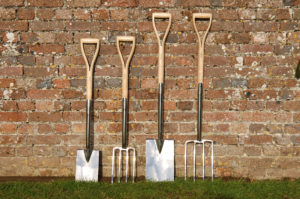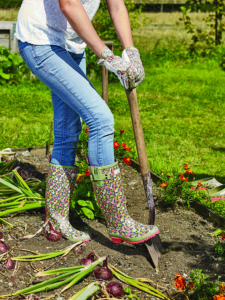As over 600 companies start to gear up for another Glee exhibition, the show organisers ask whether the affordability of gardening is changing. Is good, better, best still a thriving approach to range selections? Are high-end price tags enticing more consumers, or is bargain basement still a winning formula? Here, a number of Glee 2017 exhibitors join the debate, sharing their own thoughts and experiences.
Manufacturers of high quality agricultural and garden tools, Burgon & Ball is often considered at the top end of the market. Burgon & Ball managing director Heather Culpan commented: “We believe that consumers still respond to the good, better, best range selection. It makes it so much easier for the customer to identify which range or brand is the right one for them; they feel very comfortable with it.
 “And within that architecture, there is evidence that the market is experiencing a shift towards the higher end of the scale, revealing that the consumer buying decision is definitely not based solely on price. We often find ourselves selected as the ‘best’ offering in garden centres and we are definitely noticing that sales of our most premium products are rising strongly. Many of our top-end large digging tools, for example, have seen year-on-year growth in excess of 30% in the last year.
“And within that architecture, there is evidence that the market is experiencing a shift towards the higher end of the scale, revealing that the consumer buying decision is definitely not based solely on price. We often find ourselves selected as the ‘best’ offering in garden centres and we are definitely noticing that sales of our most premium products are rising strongly. Many of our top-end large digging tools, for example, have seen year-on-year growth in excess of 30% in the last year.
“The conclusion we have drawn is that there is a distinct move towards more considered purchases. People are thinking about the money they are spending, and want to invest in high quality tools and equipment that will last for years. We believe our customers are giving their purchase careful consideration, and viewing it as a good investment for the future, rather than going for a ‘throwaway’ option.”
 Glove and accessory brand Briers says that quality is just as, if not more, important than price. Briers director Jackie Eades said: “It would be wrong to think that all consumers have the same basis for making a decision to purchase. Price is most definitely a consideration, as we want to feel that our purchase is a good price for the quality and fit for the job they need the product to do. For some the bargain mentality is very much evident but many prefer to take a long-term view, believing that a better quality product will deliver a better long-term investment return.
Glove and accessory brand Briers says that quality is just as, if not more, important than price. Briers director Jackie Eades said: “It would be wrong to think that all consumers have the same basis for making a decision to purchase. Price is most definitely a consideration, as we want to feel that our purchase is a good price for the quality and fit for the job they need the product to do. For some the bargain mentality is very much evident but many prefer to take a long-term view, believing that a better quality product will deliver a better long-term investment return.
“For Briers, our consumers show that the trust they have in our brand is a major reason to purchase, as essentially gardening gloves are a PPE (personal protective equipment) product, so our quality and product testing are vital to them, other considerations being comfort and design (both product and surface). Good customer service support to back up the products is also essential with a well-trained customer focused team.”
Dalefoot Composts makes sustainable, peat free composts using natural ingredients from the Cumbrian fells including sheep’s wool and bracken. Since Simon Bland and Jane Barker launched the business 20 years ago, prompted by diminishing returns from their sheep farming business, their composts have been growing a loyal fan base amongst gardeners, allotment holders and professional growers.
“We find gardeners are willing to pay a little more for a product if they understand the quality of the ingredients and the benefit they bring to their plants and the environment,” said Simon. “Our composts are made from totally renewable resources with great environmental benefits. The natural water retention of wool means up to 50% less watering for your plants and wool provides a steady, slow sustained supply of nitrogen. High levels of natural potash from the bracken promotes flowering and fruiting, so healthy growth and hearty crops, and no need for any additional plant food.”
Supplying products to the garden retail sector since 1987, Woodlodge has seen the consumer landscape change dramatically. The company’s director, Michael Wooldridge, shares his thoughts on the affordability of gardening. He said: “With over two thirds of British adults visiting a garden centre every year, having products at appropriate retail prices is a must to help drive sales. Products must have a unique selling point: be it quality; originality or the right price point. Gardening does not have to be an expensive hobby, unless you want it to be.
“Whilst developing our ranges, we have to ensure that our products are at the right prices without compromising their quality. Having a wider variety of containers in our range helps garden centres to choose products at a selection of price points that appeal to their local demographic.
“High-end, branded products have proven popular and consumers are often happy to pay a little more when searching for specific items. Whether you are looking for a small, plain terracotta pot or a large, decorative, Heritage Garden planter, often purchasing a handcrafted container to complement your garden for years to come is priceless.”
 OutTrade BV/Pharao export manager Erica Adam added: “The span between high-end products and low-budget is growing in line with the demographic figures – the span between the rich and poor. Changing and decorating your garden on a yearly basis is possible through affordable products, clearly shown in the increase numbers of garden products displayed in discounters. The stability of high-end gardening stores proves the other end – the continuous popularity of high-end products.
OutTrade BV/Pharao export manager Erica Adam added: “The span between high-end products and low-budget is growing in line with the demographic figures – the span between the rich and poor. Changing and decorating your garden on a yearly basis is possible through affordable products, clearly shown in the increase numbers of garden products displayed in discounters. The stability of high-end gardening stores proves the other end – the continuous popularity of high-end products.
“With Pharao products we develop products together with our customers; whether a gardening store, DIY or hard-discount. Tailor-made offers combine affordability without losing on design or quality.”
It’s not just traditional gardening products that are seeing a shift in affordability, pet products are also affected. GA Petfoods’ spokesperson commented: “Customers are not just persuaded by price, but also by benefits and what the product can do for them. GA’s MYLABEL range for garden centres provides packaging that distinctively highlights the product benefits clearly on the front of the pack. Customers make quick decisions and product benefits should be clearly identifiable. If customers do not identify with the product’s benefits, then a purchase will not be made.
“Accessibility will also be taken into account, customers will want to know they can receive constant supply of their dog or cat food. GA’s customers can order products to their store on GA’s new online ordering site. Products can be delivered in 24 hours directly to the consumer’s address to save the garden centre handling the product; therefore, garden centres can have access to the full product range without having to stock it.”




